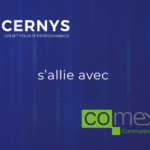The launch of a call for tender is often the first brick in a successful digital transformation. Our role is often to reassure our customers about their vision of IT: is it in line with the strategy implemented by the company and in a realistic prospective of what will be done in the future?
A call for tenders is a two-step process. The first is to identify the need and analyze its coincidence with the market. The second is the drafting, submission and closing of the tender. The company must therefore first identify precisely what it needs, but it must also ensure that the expression of these needs coincides with the suppliers’ ability to meet them.
The role of a partner such as Lucernys is first and foremost to clearly define the client’s needs and ensure that they are met. It is from this point that we can give the first technical, financial and planning orientations on the realization, even before the writing phase. Our value – and our differentiation – is clearly in this upstream phase. It is essential to the overall success of a tender.
At Lucernys, the call for tenders always falls between the Diag Flash or a master plan upstream, and the implementation or transformation phase downstream. It cannot be an isolated and autonomous step. Our role in a tender is to help the client make the best decision. We must therefore help him to identify the best technical and economical orientations to implement in relation to his problematic, whether it is technical, organizational or financial…
The needs analysis stage – through a diag flash or a master plan – allows to provide an orientation to the tender. We empower the client to make a decision about possible directions. It is only when he has validated these orientations from the collected data, that we move to the second step, the drafting of the call for tenders.
This phase allows us to build an in-depth knowledge of the problem and to take the best technical and economic orientations. The culture acquired on the issue in question will very often prove to be essential to help our clients make the best decision. It is a strong differentiating element of our expertise. We focus on providing real value in this step for our clients.
Formalize without locking in bidders
An invitation to tender must express a need in a clear manner, taking into consideration the suppliers’ capabilities. In the framing document, we formalize the problem, the technical-economic orientations as well as the planning of the realization. We also describe the client’s situation, the defined objective and the identification of the best solutions in relation to the diag-flash.
It is important at this stage not to lock the recipients of the tender into too strict a response format. The opening of the call for tenders should allow for personalized responses based on the bidders’ assessments of the project.
Avoid isolated decisions
Lucernys’ uniqueness lies in our ability to support our clients across a broad spectrum of IT production. This broad vision avoids making isolated decisions without anticipating the consequences on other aspects of IT.
Lucernys also brings an in-depth and up-to-date knowledge of the IT market, coupled with an ability to analyze the customer’s needs and to control the “adherence” with what the market knows how to do on the whole IT production: integrators, operators, storage, servers, mainframe, security…
Reassure our clients in the direction to take
The concepts of Opex or Capex do not fundamentally change the execution of the tender, the total cost of ownership (TCO) being taken into account in both cases. On the other hand, when we intervene in a call for tenders, the client expects us to guide him, and often to confirm his vision. It seeks our intimate knowledge of a market and a way to validate a vision. He wants to reassure himself on two questions: “Does our vision of IT fit well with the strategy implemented by the company? In relation to what is going to be done in the future?” Our mission is to reassure him in the direction he needs to go.
Writing a call for tenders is the end of an analysis that allows to start a transformation phase. Explaining what is proposed and being pedagogical is also very important in our consulting approach.
We are both the on-board computer that defines the road ahead, and the transmission belt to find the right resources, and move the company forward in the transformation or project management phase.
Publication based on an interview with Emmanuel Faure.






